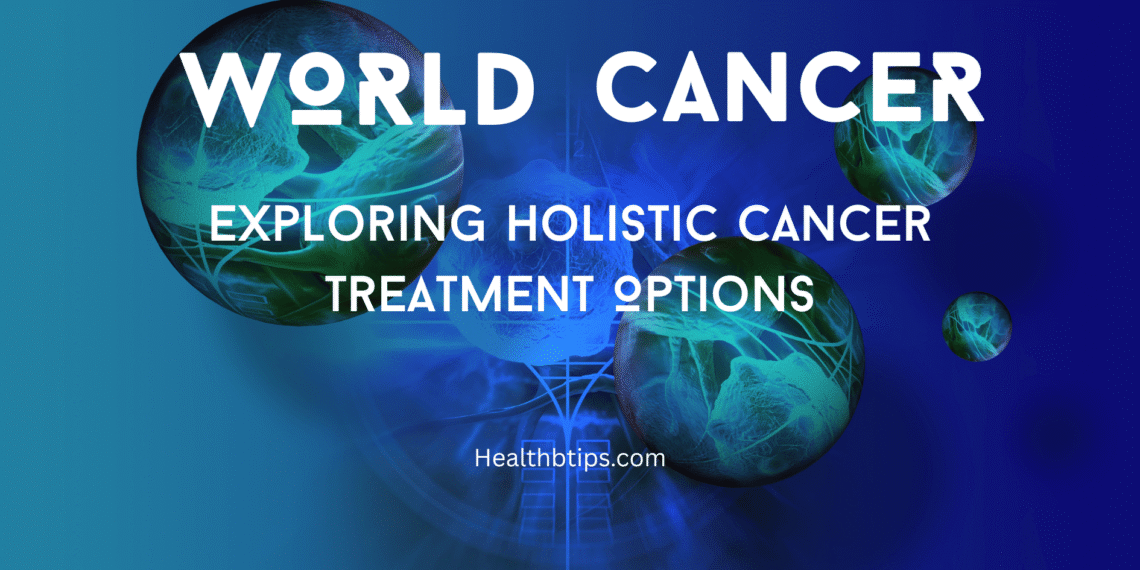When facing a cancer diagnosis, most people immediately think of surgery, chemotherapy, or radiation. While these remain vital tools in modern oncology, a growing number of patients are turning to holistic cancer treatment options—not to replace conventional care, but to complement it.
In 2025, integrative oncology has become a well-accepted part of many treatment plans. But what does “holistic cancer care” really mean? Which therapies are backed by science? And how can they help improve outcomes and quality of life?
This article breaks down holistic cancer therapies, their potential benefits, and how they fit into a comprehensive, patient-centered approach.
What is Holistic Cancer Treatment?
Holistic cancer treatment refers to therapies that consider the whole person—body, mind, and spirit—rather than just targeting the disease. The goal is to improve physical health, reduce side effects, and support emotional and mental well-being throughout the cancer journey.
Holistic approaches are usually complementary, meaning they work alongside standard treatments like chemotherapy, not instead of them.
Common goals of holistic treatment include:
- Reducing pain and inflammation
- Boosting immunity
- Supporting digestion and detoxification
- Managing stress and anxiety
- Enhancing quality of life
Top Holistic Cancer Treatment Options in 2025
Let’s explore the most popular—and promising—holistic cancer care therapies available today.
1. Acupuncture
What it is: A traditional Chinese medicine practice that involves inserting fine needles into specific points of the body.
How it helps:
- Reduces chemotherapy-induced nausea
- Eases pain and neuropathy
- Helps with fatigue and insomnia
Scientific support
The National Cancer Institute reports that acupuncture has been shown to relieve symptoms associated with cancer treatment, particularly nausea and vomiting from chemotherapy.
2. Nutritional Therapy
What it is: Personalized dietary guidance to support the immune system, reduce inflammation, and improve energy.
How it helps:
- Maintains strength during treatment
- Reduces risk of malnutrition
- May slow cancer progression when combined with medical treatment
Common protocols:
- Anti-inflammatory diets
- Organic whole foods
- Nutritional supplementation (e.g., Vitamin D, omega-3s, antioxidants)
Scientific support:
Emerging evidence shows that diet and cancer are strongly linked. Nutritional support may help reduce side effects and improve recovery post-treatment.
3. Mind-Body Techniques
Examples: Meditation, yoga, guided imagery, breathing exercises
How they help:
- Reduce stress hormone levels
- Improve sleep and mood
- Enhance immune function
Scientific support:
A 2023 study published in Psycho-Oncology showed that daily mindfulness meditation improved emotional resilience and lowered fatigue in breast cancer patients.
4. Herbal Medicine
What it is: Using plants and natural extracts to promote healing.
Popular herbs:
- Turmeric (curcumin) – anti-inflammatory
- Milk thistle – liver support
- Green tea extract – antioxidant, potential anti-cancer properties
Caution:
Always consult a doctor or integrative oncologist. Some herbs can interact with chemotherapy drugs and cause adverse effects.
5. Hyperbaric Oxygen Therapy (HBOT)
What it is: Breathing pure oxygen in a pressurized chamber to increase oxygen delivery to tissues.
How it helps:
- May reduce radiation-induced tissue damage
- Promotes healing post-surgery
- Enhances circulation and reduces fatigue
Note:
Still under investigation for cancer use. More commonly used for wound healing but gaining interest in integrative cancer care clinics.
6. IV Nutrient Therapy
What it is: High-dose vitamins and minerals administered intravenously (e.g., Vitamin C infusions)
How it helps:
- May boost immunity
- Reduces fatigue
- Supports detox during treatment
Scientific support:
Some studies suggest that high-dose IV vitamin C may improve quality of life and reduce tumor progression—though it’s not considered a standalone cure.
7. Emotional and Spiritual Support
Tools: Counseling, art therapy, group support, energy healing (e.g., Reiki)
How it helps:
- Provides emotional expression
- Reduces isolation
- Builds resilience and hope
EEAT Insight:
Recognizing the importance of mental and spiritual health is now widely acknowledged in leading cancer centers like MD Anderson and Memorial Sloan Kettering.
What Holistic Cancer Treatments Are NOT
Holistic or integrative therapies are not replacements for standard cancer treatment. Be cautious of clinics or products promising “natural cures” or advising against chemotherapy or radiation.
Red flags to avoid:
- Claims of 100% cure without scientific backing
- No licensed oncologists on staff
- High-pressure sales tactics
Always consult with your oncologist before trying new treatments—especially herbs or supplements.
Benefits of Combining Conventional and Holistic Care
The best outcomes often come from integrative oncology, which blends standard treatments with supportive holistic care.
Benefits include:
- Better symptom management
- Less anxiety and depression
- Improved treatment tolerance
- Faster recovery
- Enhanced overall survival (in some studies)
Hospitals offering integrative oncology in 2025 include
- MD Anderson Cancer Center
- Mayo Clinic
- Memorial Sloan Kettering
- Cancer Treatment Centers of America
Is Holistic Cancer Treatment Right for You?
If you’re navigating cancer in 2025, holistic treatment options can provide meaningful support—physically, emotionally, and spiritually. While not a substitute for medical treatment, therapies like acupuncture, nutrition, and mind-body practices can make your journey smoother, more empowered, and more human.
Key takeaway: Partner with your oncologist and consider building a team that supports your entire well-being.
❓ Frequently Asked Questions (FAQs)
Q1. What is holistic cancer treatment?
A: It’s a whole-body approach to cancer care that includes complementary therapies like nutrition, acupuncture, and meditation.
Q2. Are holistic therapies safe during chemotherapy?
A: Many are safe and beneficial, but always consult your oncologist before starting herbs or supplements.
Q3. Can holistic treatments cure cancer?
A: No. Holistic therapies support healing but should never replace standard medical treatment.
Q4. What’s the difference between integrative and alternative medicine?
A: Integrative medicine combines conventional and holistic care. Alternative medicine replaces conventional care—often against medical advice.
Q5. Where can I find holistic cancer clinics?
A: Look for integrative oncology programs in major hospitals or certified naturopathic oncology clinics.

